Related Topics
Literary Philadelphia
Literary
Books by Philadelphians or about Philadelphia
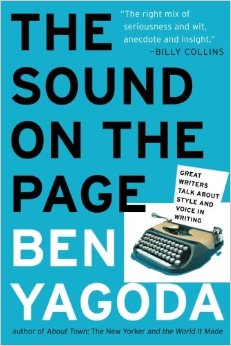
|
| The Sound on the page |
The Sound on the Page by Ben Yagoda (HarperCollins, $23.95).
Over the course of his career, acclaimed author, teacher, and critic Ben Yagoda has uncovered one certain truth about writing: "Style matters." Indeed, it is frequently the case that our favorite writers entertain, move, and inspire us less by what they say than by how they say it.
Most books, including Strunk and White's classic The Elements of Style, take a narrow view of style, suggesting that the only proper one is of plainness, simplicity, and transparency. But tell that to David Foster Wallace, Dave Eggers, Don DeLillo, and other stylistic risk takers!
While not a "how-to" manual, The Sound on the Page offers practical and incisive help for writers on identifying and developing a distinctive style and voice. Drawing on interviews with more than forty authors -- Tobias Wolff, Elmore Leonard, Michael Chabon, Cristina Garc'a, Dave Barry, Camille Paglia, Junot D'az, Margaret Drabble, and Bill Bryson among them Yagoda discusses:
- Conscious and unconscious ways writers approach to style, from Bebe Moore Campbell on her pointed use of Black English to Christopher Hitchens's penchant for adverbs
- The influence of writers on writers, including Susan Orlean on Ian Frazier, James Wolcott on Manny Farber, and Frank Kermode on William Empson
- The impact of tools on style, featuring Cynthia Ozick and Harold Bloom grumbling in harmony about the word processor and its discontents
Filled with insights from outstanding writers and close readings of their works, The Sound on the Page is an essential book for all aspiring and experienced writers, as well as for readers who are interested in learning how their favorite writers approach the craft.
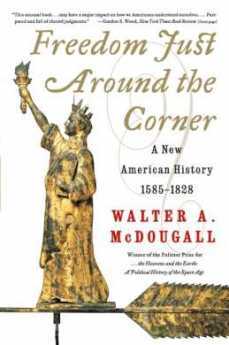
|
| Freedom Just around the corner |
Freedom Just Around the Corner: A New American History, 1528-1828 by Walter A. McDougall (HarperCollins, $34.95).
A powerful reinterpretation of the founding of America, by a Pulitzer Prize-winning historian "The creation of the United States of America is the central event of the past four hundred years," declares Walter McDougall in his preface to Freedom Just Around the Corner. With this statement begins McDougall's most ambitious, original, and uncompromising of histories. McDougall marshals the latest scholarship and writes in a style redolent of passion, pathos, and humor in pursuit of truths often obscured in books burdened with political slants.
From the origins of English expansion under Henry VIII to the founding of the United States to the rollicking election of President Andrew Jackson, McDougall rescues from myth or oblivion the brave, brilliant, and flawed people who made America great: women and men, native-born and immigrant; German, Latin, African, and British; as well as farmers, engineers, planters, merchants; Protestants, Freemasons, Catholics, and Jews; and -- last but not least -- the American scofflaws, speculators, rogues, and demagogues.
With an insightful approach to the nearly 250 years spanning America's beginnings, McDougall offers his readers an understanding of the uniqueness of the "American character" and how it has shaped the wide-ranging course of historical events. McDougall explains that Americans have always been in a unique position of enjoying "more opportunity to pursue their ambitions...than any other people in history." Throughout Freedom Just Around the Corner the character of the American people shines, a character built out of freedom to indulge in the whole panoply of human behavior. The genius behind the success of the The United States is founded on the complex, irrepressible American spirit.
A grand narrative rich with new details and insights about colonial and early national history, Freedom Just Around the Corner is the first installment of a trilogy that will eventually bring the story of America up to the present day -- a story as epic, bemusing, and brooding as Bob Dylan's "Jokerman," the ballad that inspires its titles.
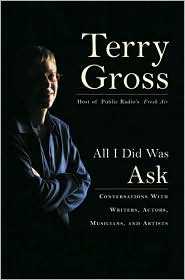
|
| All I Did Was Ask |
All I Did Was Ask by Terry Gross (Hyperion, $24.95).
A fascinating collection of revealing and entertaining interviews by the award-winning host of National Public Radio's premier interview program Fresh Air.
Over the last twenty years, Terry Gross has interviewed many of our most celebrated writers, actors, musicians, comics, and visual artists. Her show, Fresh Air with Terry Gross, a weekday magazine of contemporary arts and issues produced by WHYY in Philadelphia, is one of National Public Radio's most popular programs. More than four million people tune in to the show, which is broadcast on over 400 NPR stations across the country.
Gross is known for her thoughtful, probing interviewing style. In her trusted company, even the most reticent guest relaxes and opens up. But Gross doesn't shy away from controversy, and her questions can be tough -- too tough, apparently, for Bill O'Reilly, who abruptly terminated his conversation with her. Her interview with Gene Simmons of Kiss, which is included in the book, prompted Entertainment Weekly to name Simmons its male "Crackpot of the Year."
For All I Did Was Ask, Gross has selected more than three dozen of her best interviews -- ones of lasting relevance that are as lively on the page as they were on the air. Each is preceded by a personal introduction in which she reveals why a particular guest was on the show and the thinking behind some of her questions. And in an introductory chapter, the normally self-effacing Gross does something you're unlikely ever to hear her do on Fresh Air -- she discusses her approach to interviewing, revealing a thing or two about herself in the bargain.
The collection focuses on luminaries from the art and entertainment world, including actors, comedians, writers, visual artists, and musicians, such as:
- Conan O'Brien
- Chris Rock
- Michael Caine
- Dennis Hopper
- Dustin Hoffman
- Jodie Foster
- John Updike
- Mary Karr
- Mario Puzo
- Nick Hornby
- Chuck Close
- Eric Clapton
- George Clinton
- Sonny Rollins
- Samuel L. Jackson
- Johnny Cash
- Isabella Rossellini
- Divine
- Uta Hagen
- Carol Shields
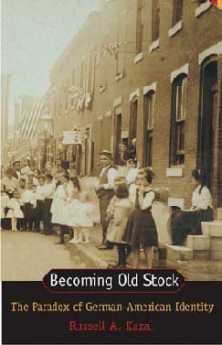
|
| Old Stock |
Becoming Old Stock: The Paradox of German-American Identity By Russell A. Kazal (Princeton, $35).
More Americans trace their ancestry to Germany than to any other country. Arguably, German Americans form America's largest ethnic group. Yet they have a remarkably low profile today, reflecting a dramatic, twentieth-century retreat from German-American identity. In this age of multiculturalism, why have German Americans have gone into ethnic eclipse--and where have they ended up? Becoming Old Stock represents the first in-depth exploration of that question. The book describes how German Philadelphians reinvented themselves in the early twentieth century, especially after World War I brought a nationwide anti-German backlash.
Using quantitative methods, oral history, and cultural analysis of written sources, the book explores how, by the 1920s, many middle-class and Lutheran residents had redefined themselves in "old-stock" terms--as "American" in opposition to southeastern European "new immigrants." It also examines working-class and Catholic Germans, who came to share a common identity with other European immigrants, but not with newly arrived black Southerners.
Becoming Old Stock sheds light on the way German Americans used to race, American nationalism, and mass culture to fashion new identities in place of ethnic ones. It is also an important contribution to the growing literature on racial identity among European Americans. In tracing the fate of one of America's largest ethnic groups, Becoming Old Stock challenges historians to rethink the phenomenon of ethnic assimilation and to explore its complex relationship to American pluralism.
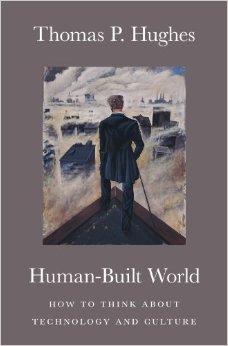
|
| Human-Built the world |
Human-Built World by Thomas P. Hughes (University of Chicago, $22.50).
To most people, technology has been reduced to computers, consumer goods, and military weapons; we speak of "technological progress" in terms of RAM and CD-ROMs and the flatness of our television screens. In Human-Built World, thankfully, Thomas Hughes, a professor emeritus at Penn, restores to technology the conceptual richness and depth it deserves by chronicling the ideas about technology expressed by influential Western thinkers who not only understood its multifaceted character but who also explored its creative potential.
Hughes draws on an enormous range of literature, art, and architecture to explore what technology has brought to society and culture and to explain how we might begin to develop an "ecotechnology" that works with, not against, ecological systems. From the "Creator" model of development of the sixteenth century to the "big science" of the 1940s and 1950s to the architecture of Frank Gehry, Hughes nimbly charts the myriad ways that technology has been woven into the social and cultural fabric of different eras and the promises and problems it has offered. Thomas Jefferson, for instance, optimistically hoped that technology could be combined with nature to create an Edenic environment; Lewis Mumford, two centuries later, warned of the increasing mechanization of American life.
Such divergent views, Hughes shows, have existed side by side, demonstrating the fundamental the idea that "in its variety, technology is full of contradictions, laden with human folly, saved by occasional benign deeds, and rich with unintended consequences." In Human-Built World, he offers the highly engaging history of these contradictions, follies, and consequences, a history that resurrects technology, rightfully, as more than gadgetry; it is in fact no less than an embodiment of human values.
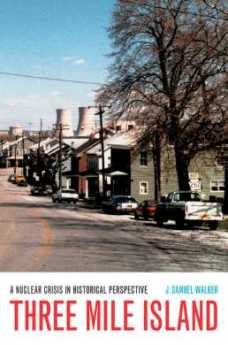
|
| Three Mile Island |
Three Mile Island by J. Samuel Walker (California, $24.95)
Twenty-five years ago, Hollywood released The China Syndrome, featuring Jane Fonda and Michael Douglas as a TVnews crew who witness what appears to be a serious accident at a nuclear power plant. In a spectacular coincidence, on March 28, 1979, less than two weeks after the movie came out, the worst accident in the history of commercial nuclear power in the United States occurred at Three Mile Island. For five days, the citizens of central Pennsylvania and the entire world, amid growing alarm, followed the efforts of authorities to prevent the crippled plant from spewing dangerous quantities of radiation into the environment. This book is the first comprehensive account of the causes, context, and consequences of the Three Mile Island crisis. In gripping prose, J. Samuel Walker, the historian of the U.S. Nuclear Regulatory Commission, captures the high human drama surrounding the accident, sets it in the context of the heated debate over nuclear power in the seventies, and analyzes the social, technical, and political issues it raised. His superb account of those frightening and confusing days will clear up misconceptions held to this day about Three Mile Island.
The heart of Walker's suspenseful narrative is a moment-by-moment account of the accident itself, in which he brings to life the players who dealt with the emergency: the Nuclear Regulatory Commission, the state of Pennsylvania, the White House, and a cast of scientists and reporters. He also looks at the the aftermath of the accident on the surrounding area, including studies of its long-term health effects on the population, providing a fascinating window onto the politics of nuclear power and an authoritative the account of a critical event in recent American history.
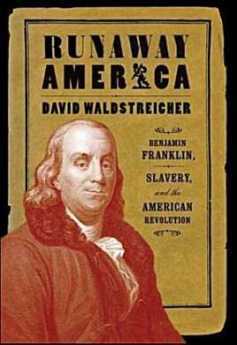
|
| Runway America |
Runaway America: Benjamin Franklin, Slavery and the American Revolution by David Waldstreicher (Hill & Wang, $25).
Scientist, abolitionist, revolutionary: that is the Benjamin Franklin we know and celebrate. To this description, the talented young historian David Waldstreicher shows we must add runaway, slave master, and empire builder. But Runaway America does much more than revise our image of a beloved founding father. Finding slavery at the center of Franklin's life, Waldstreicher proves it was likewise central to the Revolution, America's founding, and the very notion of freedom we associated with both.
Franklin was the sole Founding Father who was once owned by someone else and was among the few to derive his fortune from slavery. As an indentured servant, Franklin fled his master before his term was complete; as a struggling printer, he built a financial empire selling newspapers that not only advertised the goods of a slave economy (not to mention slaves) but also ran the notices that led to the recapture of runaway servants. Perhaps Waldstreicher's greatest achievement is in showing that this was not an ironic outcome but a calculated one. America's freedom, no less than Franklin's, demanded that others forgo liberty.
Through the life of Franklin, Runaway America provides an original explanation to the paradox of American slavery and freedom.
How to Create Your Own African American Library
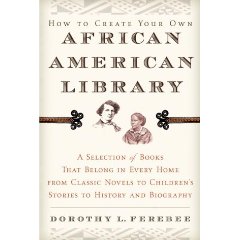
|
| African America |
by Dorothy L. Ferebee (Ballantine, $13.95).
Here is the first book ever written to help African Americans build a home library that celebrates the diversity of their culture and heritage. How to Create Your Own African American Library truly does unlock the door to knowledge and power.
With warm and expert commentary, experienced book reviewer and avid reader Dorothy Ferebee reviews and recommends books that will help you to build your own home library. Inside you'll discover:
- Nonfiction From autobiography to history, including Resistance and Rebellion Against Slavery and the Civil Right Movement.
- Fiction: Literature that explores the many facets of the African American life.
- Culture and Anthropology Books that will open doors to new insights on the African American experience.
- Children's books From picture books to teenage fiction books that empower children and make them proud of who they are.
- Health Guides that teach you how to take the very best care of yourself, with attention to health issues that affect African Americans.
Plus books on Travel, Music, Poetry, and Special Collections!
Here's all you need to know to create a mini-university in your own home, one that is open every day to support the highest aspirations of yourself, your children, and their children.
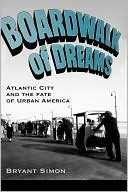
|
| Boardwalk of Dreams |
Boardwalk of Dreams by Bryant Simon (Oxford, $35).
No one can deny that casinos have brought money and crowds back to Atlantic City. Since the first casino opened in 1978, gambling corporations have invested six billion dollars in the old resort town and, during the 1990s, more tourists visited Atlantic City than any other place in the United States including Las Vegas and Disneyworld. Perhaps the finest book ever written about Atlantic City, The complete review of this book by a Temple University scholar is available on Amazon.com at the link above.
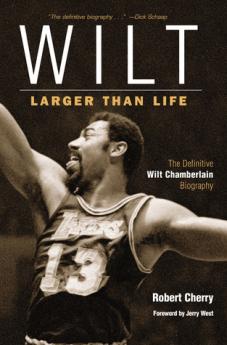
|
| Wilt |
Wilt by Robert Cherry (Triumph, $24.95).
Authoritative, informative, and entertaining, Wilt is the first standard biography about this American legend the unique and unforgettable Wilt Chamberlain. One of the 20th century's greatest and most controversial athletes, Wilt also had an intensely private side that the author uncovers through years of interviews with the people closest to Wilt up until the time of his death in 1999. This groundbreaking work successfully captures Wilt Chamberlain the man, while also closely examining the better-known myths that surrounded him throughout his life.
REFERENCES
| Runaway America: Benjamin Franklin, Slavery, and the American Revolution, David Waldstreicher ISBN-13: 978-0809083152 | Amazon |
REFERENCES
| Freedom Just Around the Corner: A New American History: 1585-1828: Walter A. McDougall ISBN-13: 978-0060197896 | Amazon |
Originally published: Tuesday, May 23, 2006; most-recently modified: Wednesday, May 15, 2019